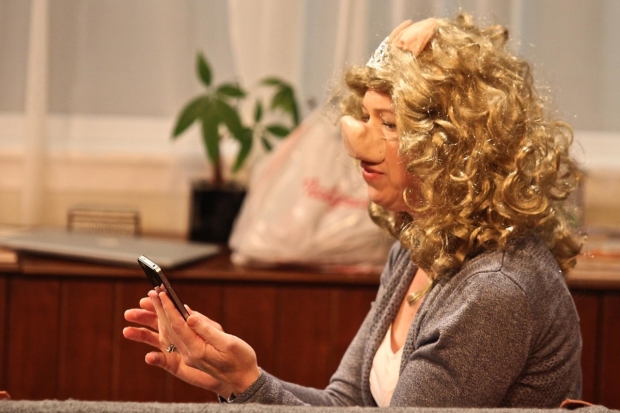The Cheats

(© Gregg Gilman)
When rising playwright Hamish Linklater visited tiny Steep Theatre last fall to check out the Midwest premiere of The Vandals, he liked what he saw. The Edgewater theater with a stage like a breakfast nook delivered outsize grit and intensity, turning the tiny space into a hothouse of emotion. That Linklater handed over the world premiere of The Cheats to Steep speaks to the company's gift for dramatizing the demons of everyday living.
There are plenty of demons in The Cheats, a four-person exploration of two marriages in varying states of unease and dysfunction. But even with the capable direction by Joanie Schultz, The Cheats is hobbled by a script full of situations that don't ring true. As in The Vandals, there's riotous amounts emoting onstage. But where The Vandals thrilled with its harrowing authenticity, The Cheats feels contrived and insubstantial.
At lights up, it's clear that Linklater's aim is to plumb the dark underbelly of sunny suburbia. At center stage, a living room window offers a view of sunshine and palm trees. On an adjacent patio, a silently glowering man sits staring into the distance, his face the absolute opposite of that cheery view.
We're in the home of Anne (Kendra Thulin) and John (Peter Moore). As John spies on the neighbors, Anne prattles on from a back bedroom, mostly unheard by her preoccupied husband. Something's amiss with the neighbors, and John is determined to figure out precisely what it is. Linklater's 90-minute drama, simmers with ominousness throughout and ultimately explodes into physical violence. But the lead up to that final denouement is a long slog, and when the fireworks finally erupt, they don't feel true. Anne and their neighbors John and Susie (Julia Siple) and Jonathan (Brad Akin) seem more like the beginnings of two troubled married couples rather than fully formed duos. Their interactions – from John's Rear Window-ish spying and to the entrance of a massive, shaggy hound who pretty much steals the entire show – seem more like preludes to a longer, larger narrative than complete stories unto themselves.
The script's problems emerge in the first scene, as John peers intently across the street while his wife, Anne, delivers a monologue from offstage. Anne's lengthy opener sounds like a prepared speech rather than the impromptu rambling it's supposed to be — and it feels inauthentic. John doesn't hear his wife because he's staring with a mute, catatonic-like focus at the neighbors. In real life, the length of his silence would prompt Anne to check on John far sooner than she actually does. Instead, she goes on and on, not at all concerned that her husband is so peculiarly nonresponsive.
Eventually, Anne makes her way into the living room, where John finally breaks his silence. The neighbors are acting weird, he tells Anne, and then he proceeds to relate a vaguely troubling scenario he's witnessed. Shortly after John and Anne's discussion about the oddities of their neighbors, Jonathan shows up in their doorway. Linklater's script falters further when Jonathan abruptly bursts into Anne and John's living room. The intruder simply stands there, staring silently. Instead of asking this peculiar, wordless intruder to leave, Anne and John act as if Jonathan's behavior is completely normal. They even alter their plans so they can accommodate his hulking, menacing presence. After an improbably lengthy amount of time, Jonathan finally starts speaking, and the three suburbanites begin to reveal the cracks in their seemingly idyllic existences. In exploring unhappy inner lives of outwardly happy people, Linklater mines familiar yet potentially rich dramatic territory. But he does so without uncovering anything especially new or noteworthy.
Still, Schultz draws some moderately effective performances from her cast, notably Siple whose 11th-hour entrance brings with it a blast of vividness and authenticity that's largely missing in the rest of the ensemble. She’s the one person in this quartet who is believable. Siple makes her Susuan flawed but striving, a woman beset by troubles she’s trying to overcome. As far as characters go, Anne and Jonathan are forgettable. As a result, Thulin and Moore don't really make much of an impression. What drives more John to surveil his neighbors and then analyze their every move? We never find out, and since spying is his primary activity in the piece, he remains a blank. Thulin, despite her opening monologue, never displays any sort of defining personality traits. She seems to have no needs, no wants, and no feeling one way or the other about her husband. The result is a character that never feels fully formed. Akin plays Jonathan as borderline mentally ill. His prolonged, silent stare-down with John and subsequent outburst of temper is the action of somebody significantly lacking everyday socialization skills. It's an interesting choice, it doesn't feel that supported by the narrative.
Scenic designer Chelsea Warren makes the Los Angeles ranch home set look reasonably authentic, but it's strangely sterile, like a furnished apartment that someone has just moved into. Costume designer Izumi Inaba is similarly vague and generic with her costume choices, no one onstage wears anything that speaks to their personality.
That sort of generic blandness is part of what makes The Cheats so frustrating. The people onstage evoke no empathy, and not one of them reads as a believably complex human. They are almost automatons, going through the motions of telling a story without really telling it. That's the real "cheat" of this production.











